| | | | | | | Presented By Global X ETFS | | | | Axios World | | By Dave Lawler · Oct 31, 2022 | | Welcome back to Axios World. - I'm still in Costa Rica so tonight's edition (1,981 words, 7 minutes) is brought to you with the help of my editor, Laurin-Whitney Gottbrath.
- We'll start with Brazil's nail-biter election.
New arrival? Subscribe. | | | | | | 1 big thing: Lula's comeback cements region's shift to the left | 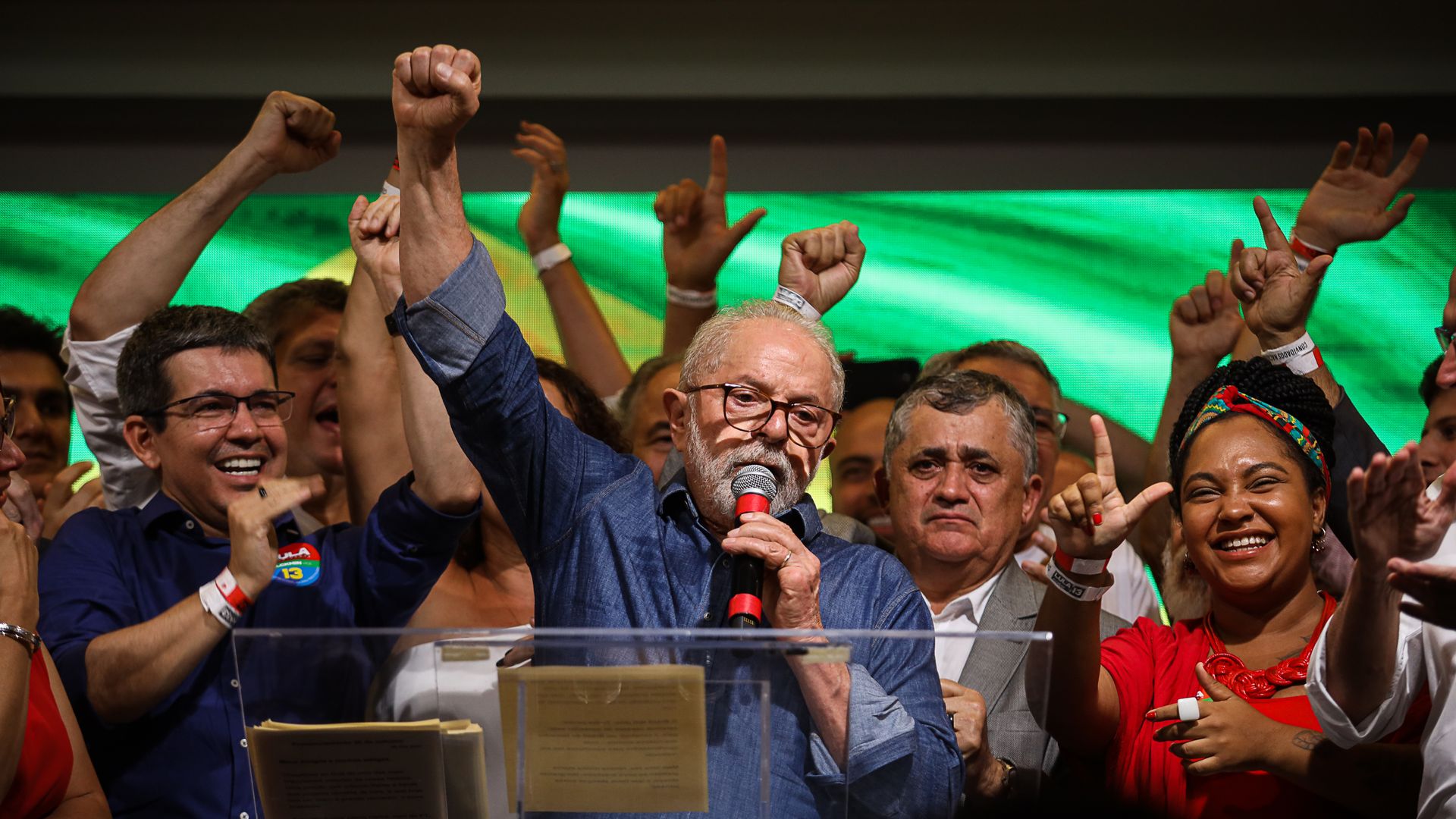 | | | Luiz Inácio Lula da Silva celebrates his victory in Sao Paulo, Brazil. Photo: Danilo Martins Yoshioka/Anadolu Agency via Getty Images | | | | The shift from President Jair Bolsonaro to President-elect Luiz Inácio Lula da Silva brings a sea change not only for Brazil itself, but also for the global role of Latin America's largest country, economy and diplomatic power. Why it matters: Lula's victory means that all of Latin America's largest countries and economies will be led by left-wing leaders. He has big ambitions to bring that burgeoning bloc closer together and to restore Brazil's tarnished global stature, especially on environmental issues. - "It was my government that gave citizenship to Brazil in the realm of international relations. Never before in the history of Brazil was Brazil so respected in the world," he claimed in one presidential debate.
- Andre Pagliarini writes in the SAIS Review of International Affairs that Lula "will all but certainly resume his project of positioning Brazil as an independent power capable of negotiating equally as well with the West and East."
Flashback: In his previous tenure (2003-2010), Lula pursued a geopolitical role in line with Brazil's surging economy. On his watch, Brazil led an international intervention in Haiti and attempted nuclear diplomacy with Iran. - Lula clashed at times with the U.S. over the Iraq war and a proposed hemisphere-wide trade deal, which he helped block over an agriculture subsidies dispute.
- He also cultivated close ties with China — one of several areas that could spark tensions with Washington this time around. "The BRICS will be back," a U.S. official told Axios unenthusiastically, referring to the partnership between Brazil, Russia, India, China and South Africa that Lula helped to forge.
State of play: Bolsonaro's attacks on Brazil's electoral system alienated him from Biden's White House, but he generally aligned with the U.S. on regional issues like Cuba and Venezuela, and the Trump administration named Bolsonaro's Brazil a major non-NATO ally. - In contrast, Lula's views on protecting the Amazon and Brazilian democracy have been welcomed by Washington, but his long-standing ties with leaders in Cuba, Nicaragua and Venezuela could "become a point of friction," says Lauri Tähtinen of the Center for Strategic and International Studies.
Between the lines: Brazilian leaders across the political spectrum bristle when U.S. and European leaders try to lecture them, Tähtinen says, noting that the BRICS format is useful in part because it puts Brazil on a par with other non-Western global powers. - On a regional level, Tähtinen expects many gatherings and new institutions of the sort Lula spearheaded previously. But he's skeptical that Lula will truly achieve deeper regional integration, such as his idea for a currency union.
What to watch: Brazil's circumstances have changed since Lula left office, largely due to to a decade-long economic slump. Brazil's internal political turmoil might make it more difficult to focus on events beyond his borders. - But after years of relative international isolation under Bolsonaro, Brazil's global profile is about to change dramatically.
|     | | | | | | 2. Bolsonaro stays silent | 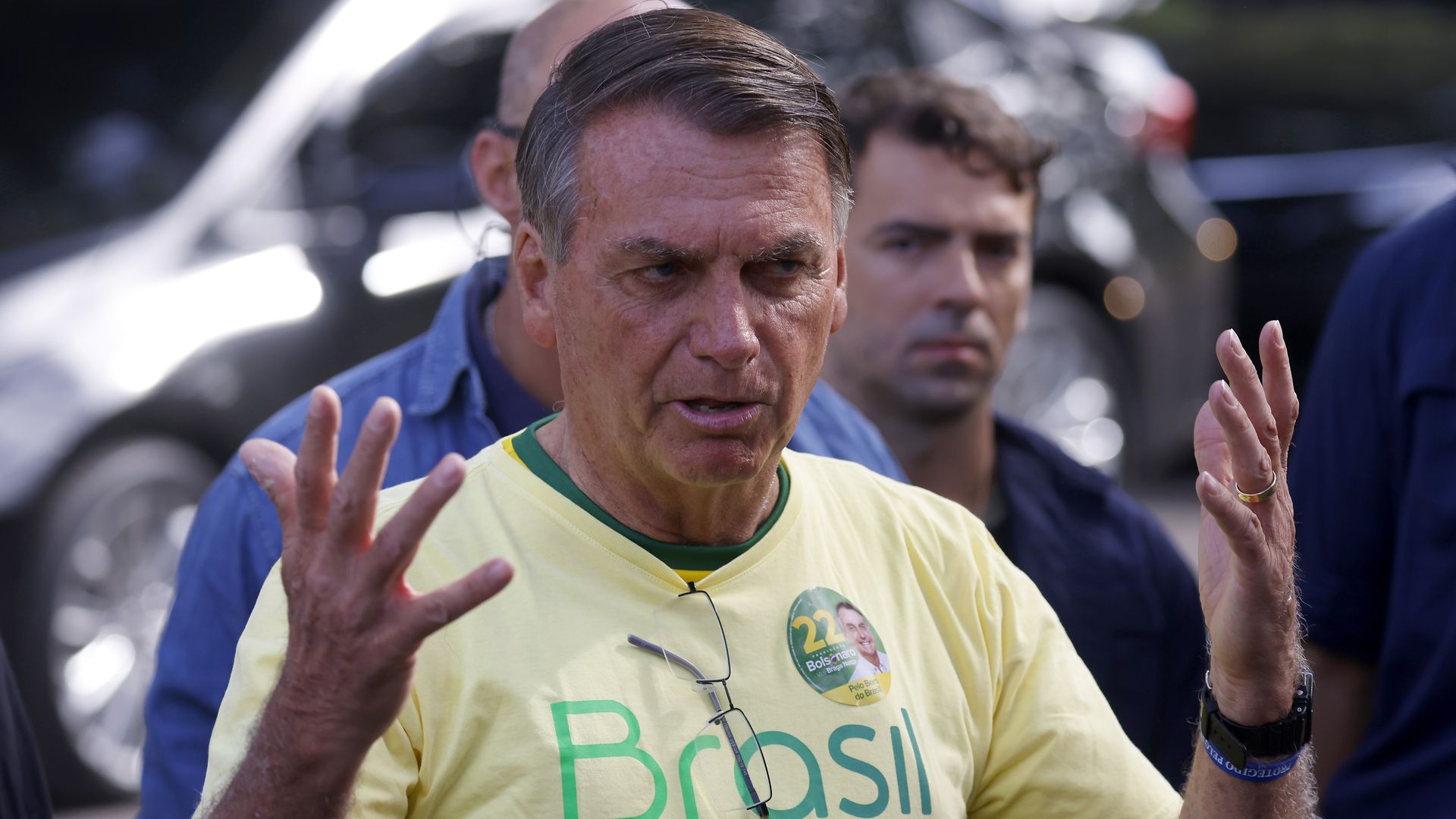 | | | Jair Bolsonaro talks to the press after voting on Oct. 30 in Rio de Janeiro, Brazil. Photo: Wagner Meier/Getty Images | | | | President Bolsonaro has yet to say anything publicly nearly 24 hours after results show he narrowly lost to Lula. The big picture: His continued silence has increased fears he might mount an aggressive challenge to the results after baselessly claiming for months that Brazil's electoral system could be manipulated. Driving the news: Bolsonaro held more than six hours of closed-door meetings at government headquarters before returning to his residence this afternoon, the New York Times reports. - While the president remained silent, his son and top adviser, Flavio Bolsonaro, spoke up on Twitter, saying today: "Let's lift our heads and not give up on our Brazil! God is in charge!"
- Bolsonaro is expected to address the results tomorrow, though it's unclear if he plans to formally concede, per the Times.
State of play: A slew of world leaders, including President Biden, recognized Lula's victory. - Biden called Lula today to congratulate him on his win, the White House said.
Even some of Bolsonaro's most vocal supporters appeared ready to move on and accept the election results. - "The election result is sovereign," Tarcísio de Freitas, a Bolsonaro supporter who was elected governor of São Paulo, told reporters Monday, per The Guardian.
The bottom line: "I don't know if he will call or if he will recognize my victory," Lula told his supporters after his victory on Sunday. |     | | | | | | 3. World reels after a weekend of mass tragedies | 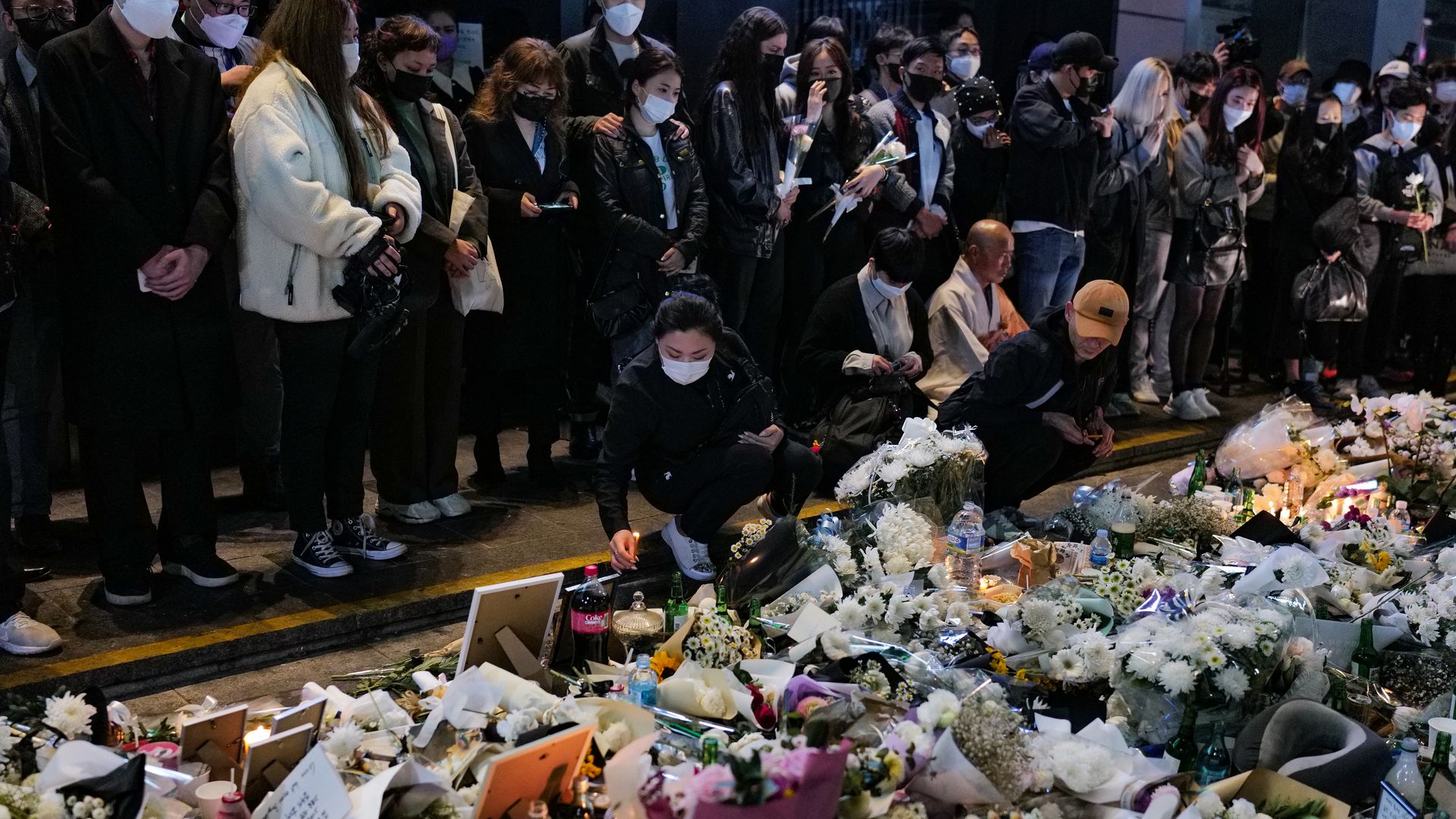 | | | People pay tribute for the victims of the crowd-surge tragedy in Seoul, South Korea. Photo: Chris Jung/NurPhoto via Getty Images | | | | People worldwide are mourning the deaths of hundreds of people after separate mass tragedies hit several countries, including South Korea, India, Somalia and the Democratic Republic of the Congo, over the weekend. What happened: More than 150 people were killed in a crowd surge in Seoul on Saturday after thousands packed into narrow streets in the capital's nightlife area of Itaewon for Halloween festivities. - President Yoon Suk-yeol announced a weeklong national mourning period, and authorities have started an investigation.
In Somalia, twin car bombings in the capital of Mogadishu killed at least 120 people on Saturday, authorities say. In India, at least 134 people died when a suspension bridge collapsed in the western state of Gujarat on Sunday. - Police arrested nine people today as part of their investigation into the collapse.
In the DRC, at least 11 people were killed in a crowd crush at a concert in Kinshasa's largest stadium, Reuters reports. - The stadium was packed beyond its capacity for a concert by Congolese singer Fally Ipupa.
- Ipupa said he only heard about the deaths on Sunday morning, telling Reuters: "It pains me. I am from Kinshasa and of course I share in the grief of the families."
|     | | | | | | A message from Global X ETFS | | Build a greener investment portfolio | | | 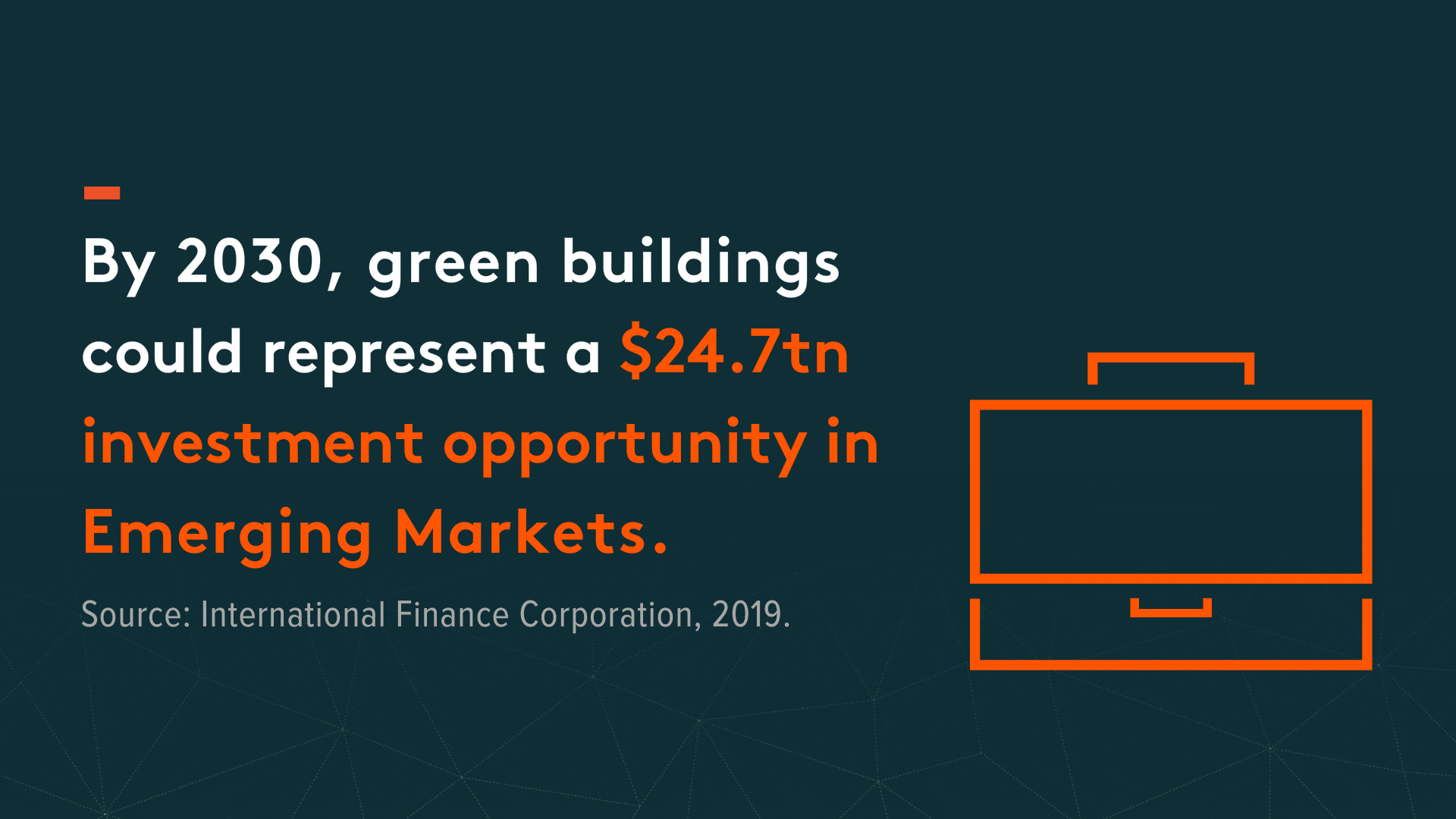 | | | | Government policies and private sector commitments to combat climate change are driving demand for more sustainable buildings. We recently explored the long-term investment case for companies involved in the development, management and technology powering green buildings. Learn more. | | | | | | Bonus: Where in the world? | 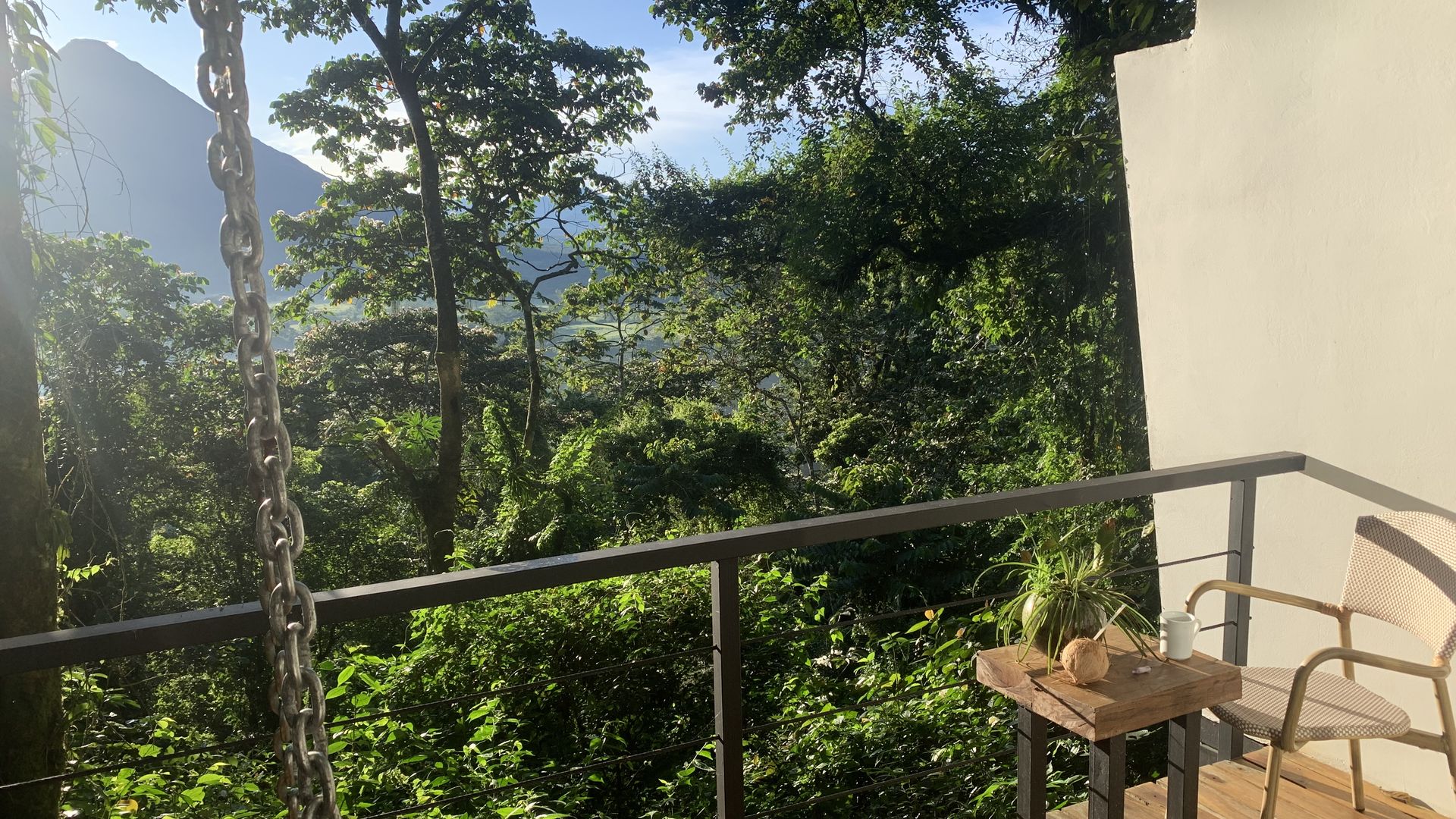 | | | Looking out onto the Arenal volcano. Photo: Your author | | | | Inspired by the view from my current "home office," today's topic is famous volcanoes. I give you the volcano, you give me the country. Note: In two cases (marked with *) I'm looking for a territory or region, not a country. - Vesuvius: Destroyed Pompeii in 79 AD
- Fuji: A national symbol often featured in artworks, it hasn't erupted for 300 years.
- Krakatoa: Its 1883 eruption destroyed an island and was felt around the world
- Eyjafjallajökull: Its 2010 eruption disrupted trans-Atlantic air travel
- Kilimanjaro: A dormant volcano, and the highest peak on its continent
- Elbrus: A dormant volcano, and the highest peak on its continent
- Sidley*: A dormant volcano, and the highest volcano on its continent
- Mauna Loa: The world's largest active volcano, currently under advisory due to earthquake activity.
- Thera: Its massive eruption around 3,800 years ago is claimed by some to have shaped the fates of multiple ancient civilizations.
- Bonus: Now a top tourist destination, ancient Thera is now known as ___
- St. Helens: Its 1980 eruption killed 57 people.
- Tambora: Its 1815 eruption caused "the year without summer."
- Pinatubo: Its 1991 eruption was the biggest on earth since 1912.
- Nevado del Ruiz: Its 1985 eruption buried a town and killed 25,000.
- Pelée*: Its 1902 eruption was the deadliest of the 20th century and destroyed the city of Saint Pierre, sometimes referred to as "the Paris of the Caribbean."
Scroll to the bottom for answers. |     | | | | | | 4. U.S. "not going to waste time" on Iran deal | 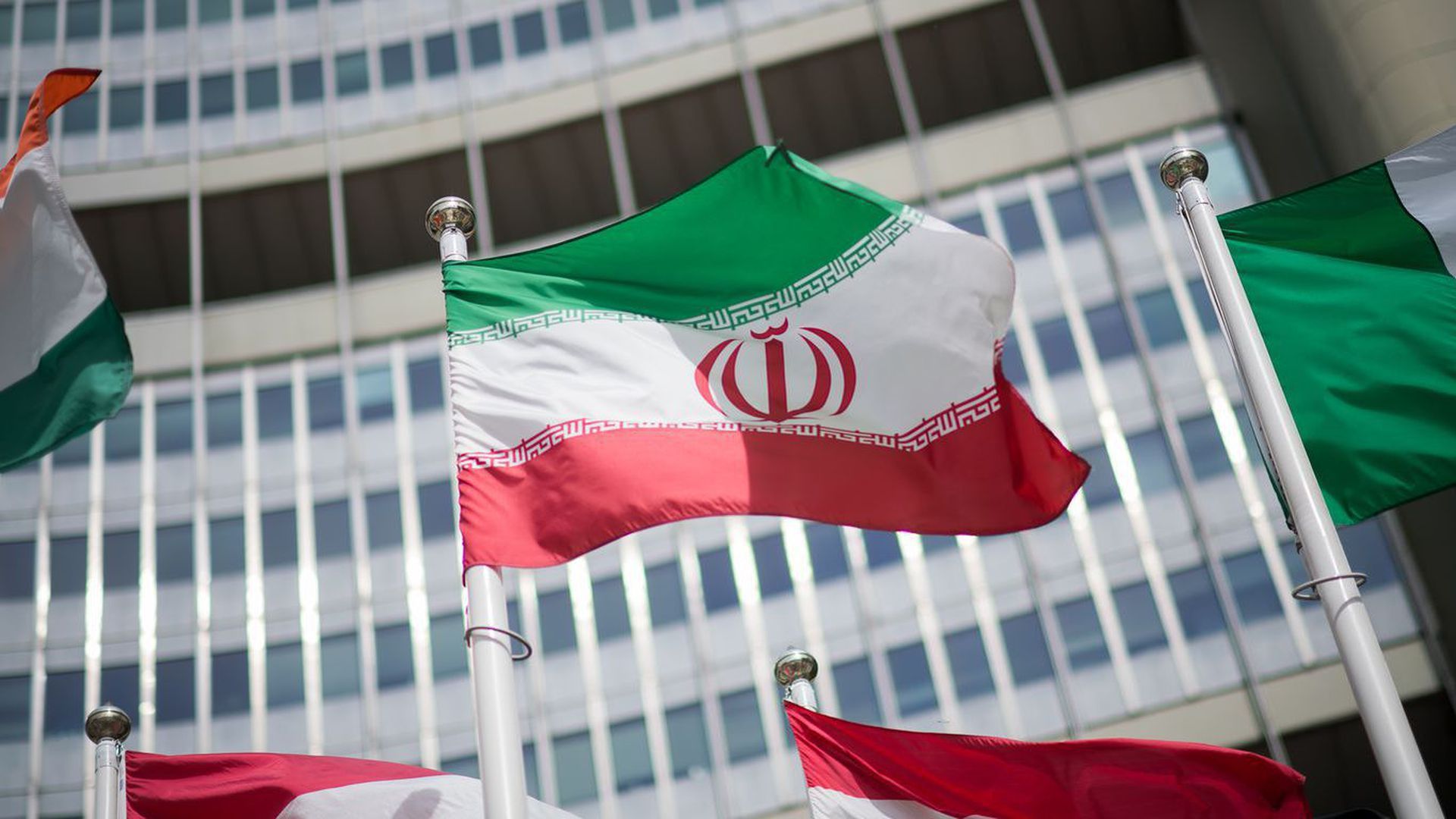 | | | The flag of Iran in front of the International Atomic Energy Agency headquarters. Photo: Michael Gruber/Getty Images | | | | U.S. special envoy for Iran Robert Malley said today that the Biden administration is not going to "waste time" on trying to revive the Iran nuclear deal at this time considering Tehran's crackdown on protesters, Iranian support for Russia's war in Ukraine, and Iran's positions on its nuclear program, Axios' Barak Ravid reports. Why it matters: While the Biden administration has not formally said the nuclear talks are dead, Malley's comments at a Carnegie Endowment event were the closest the U.S. has come to admitting there's no path forward. What they're saying: The nuclear talks are "not our focus right now," Malley said. - "It is not on our agenda. We are not going to focus on something which is inert when other things are happening…and we are not going to waste our time on it… if Iran has taken the position it has taken," Malley said.
Between the lines: Another senior Biden administration official recently told Barak the White House position on the nuclear talks was even tougher. - The official said that Tehran's response to the protests coupled with Iran's support of Russia's war in Ukraine fundamentally changed the situation, and therefore, even if Iran came back to the table today and said it wanted a nuclear deal, the U.S. was unlikely to move forward.
The big picture: Malley said the Biden administration hasn't given up on diplomacy to solve the Iranian nuclear issue, but noted that President Biden is ready to use military means as a last resort to prevent Iran from acquiring a nuclear weapon. |     | | | | | | 5. Russian oil and gas permanently weakened |  Data: International Energy Agency; Chart: Axios Visuals A new report says the Russian oil and gas sector will never fully recover from the fallout of the invasion of Ukraine, Axios Generate co-author Ben Geman writes. Why it matters: The findings from the International Energy Agency show how Russia's decision to attack Ukraine this year has upended international markets and imperiled the future energy leverage of a U.S. adversary. - Western sanctions, President Vladimir Putin's cuts in gas exports to Europe, and Europe's efforts to wean itself off Russian fuels are all slated to erode Russia's market position.
- In 2021 Russia was the world's largest natural gas exporter. It is also a huge source of oil for global markets.
|     | | | | | | 6. One to watch: Scholz's visit to China | 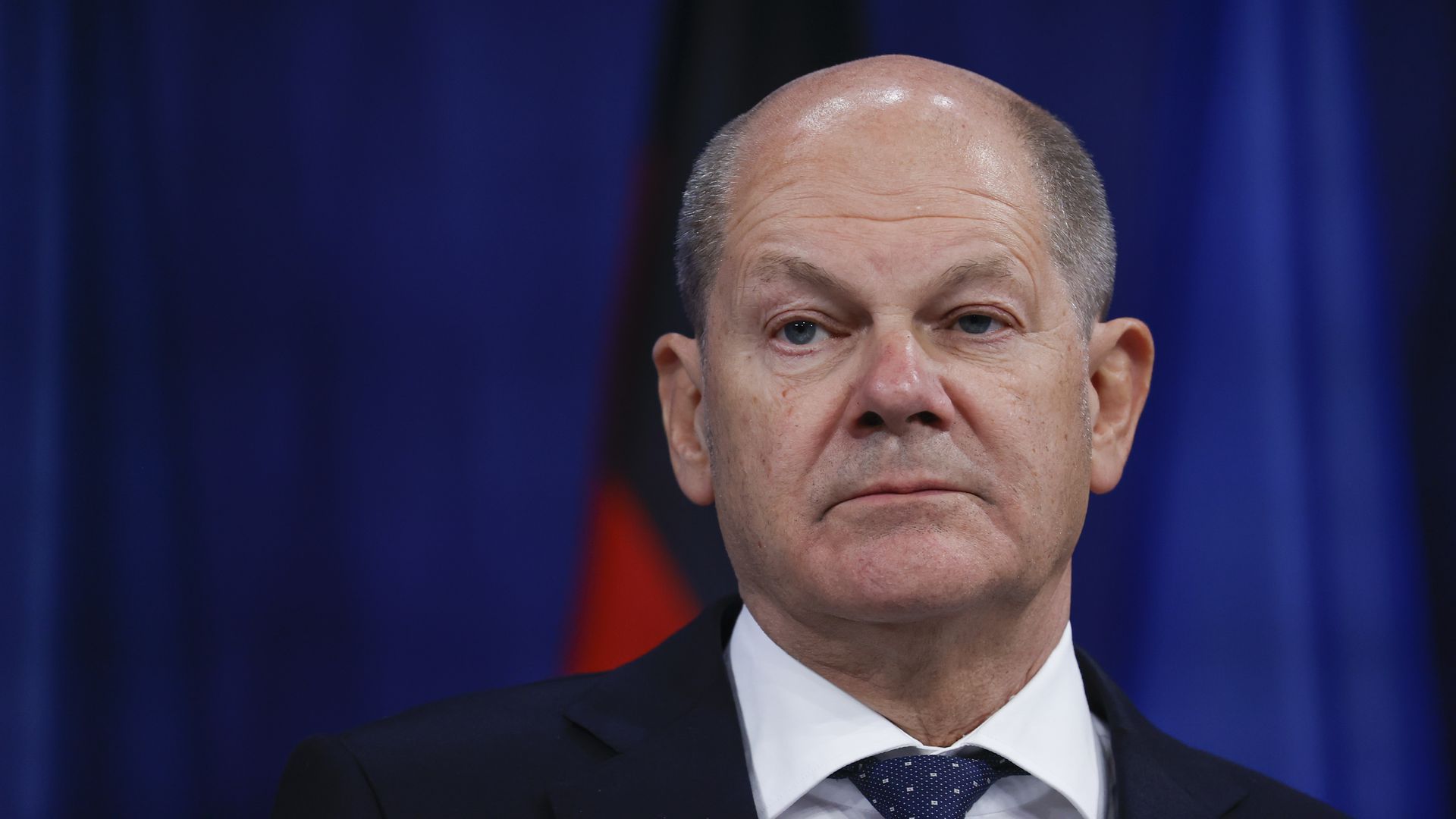 | | | German Chancellor Olaf Scholz speaks at the European Council headquarters in Brussels on Friday. Photo: Valeria Mongelli/Bloomberg via Getty Images | | | | German Chancellor Olaf Scholz's visit to China later this week could trigger fierce backlash at home, analysts told Axios' Han Chen. Why it matters: Scholz's trip on Friday with a delegation of business leaders will make him the first EU leader to visit the Asian country since the start of the COVID-19 pandemic. - The trip could send a confusing signal about how Europe's largest economy plans to deal with Beijing, especially as other EU countries increasingly toughen their stances on China, analysts say.
State of play: Scholz's predecessor, Angela Merkel, had close economic ties with Beijing. China was Germany's top trading partner over the past six years, with bilateral trade reaching $245 billion last year. - But 84% of Germans would like the country to reduce economic ties with China, according to a recent poll by German public service broadcaster ZDF.
- "Germany made a big bet on China," says Noah Barkin, a managing editor of Rhodium Group's China practice. "For many years, this was seen as a source of strength. Now it has become a vulnerability."
Details: Scholz will urge Beijing to open up its market and raise human rights concerns while in China, a German government spokesperson said last Friday, per Reuters. - The spokesperson added that Berlin was against "decoupling" from China's economy.
What they're saying: "It feels at the moment that the Chancellory is specifically trying to maintain a certain traditional framework and economic ties with China, in the teeth of pretty sweeping opposition from ... the public, most of his coalition and increasingly other parts of Europe as well," says Andrew Small, a senior fellow at the German Marshall Fund. The big picture: Germany has been hard hit by the war in Ukraine after Russia cut its gas supply to Europe. With a recession looming, analysts say Scholz can't afford to jeopardize Germany's economic relationship with China. - But at the same time, Berlin could become a weak link in the "wider systemic rivalry" between the West and China, especially as other European countries move away from China, Small says.
- Other EU countries, including Estonia and Latvia, have criticized the planned trip, saying such unilateral diplomacy could detract from the bloc's desire to speak to China with a "single voice."
Go deeper. |     | | | | | | 7. Stories we're watching | 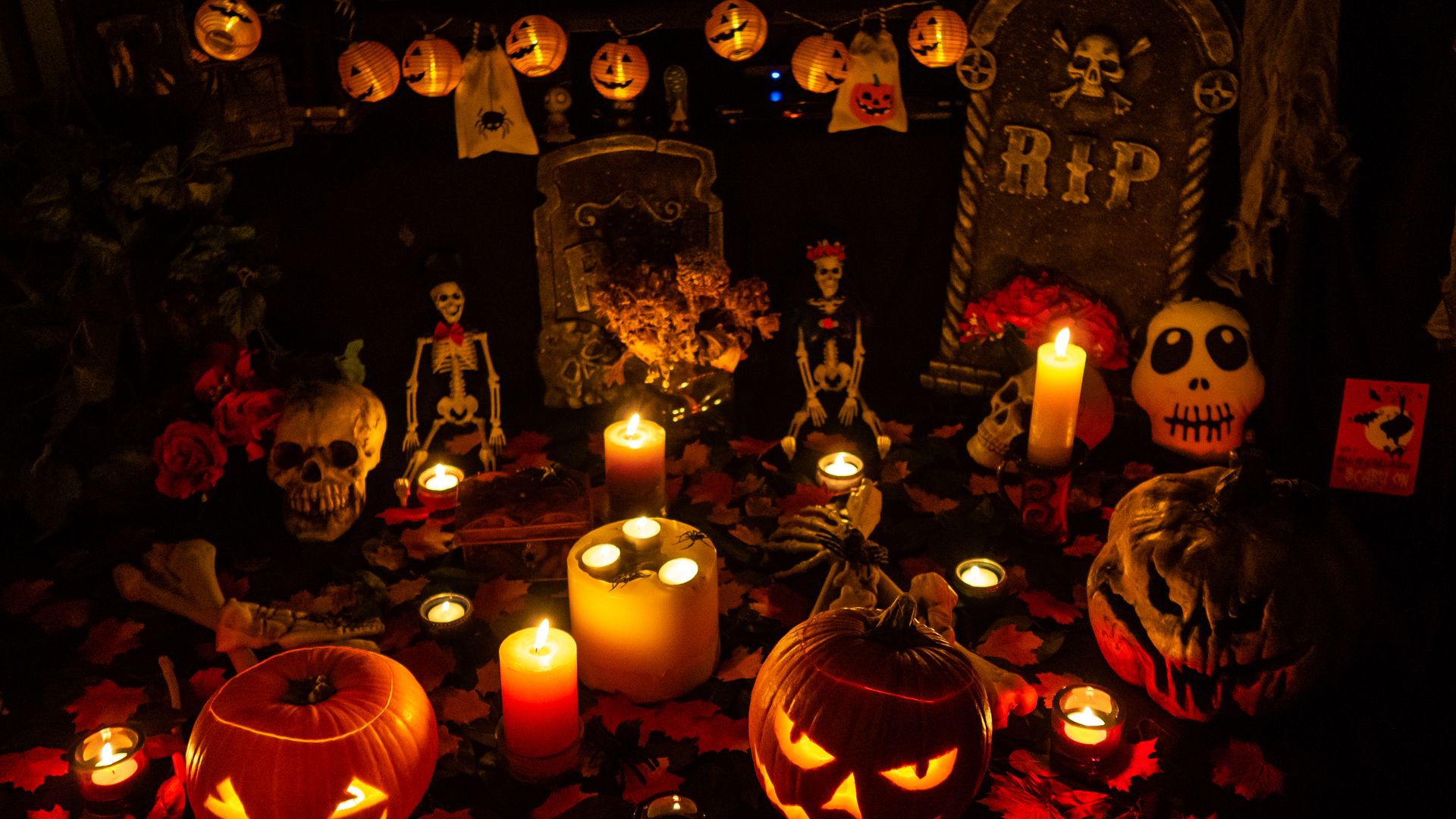 | | | Pumpkins carved for Halloween sit in a living room in Nijmegen, Netherlands. Photo: Romy Arroyo Fernandez/NurPhoto via Getty Images | | | - Iran protests continue despite warning from Revolutionary Guard
- Blinken speaks with top China diplomat ahead of G20
- U.S. and South Korea launch biggest-ever air drills
- U.S. accuses Russia of "weaponizing food"
- Norway raises military alert in response to Ukraine war
- Shanghai Disney shuts over COVID, visitors unable to leave
- IMF says Middle East, North Africa economies resilient in 2022
Quoted: "There are not two Brazils. We are one country, one people, one great nation." — Luiz Inácio Lula da Silva after winning Brazil's presidential election |     | | | | | | A message from GLOBAL X ETFS | | Build a greener investment portfolio | | | 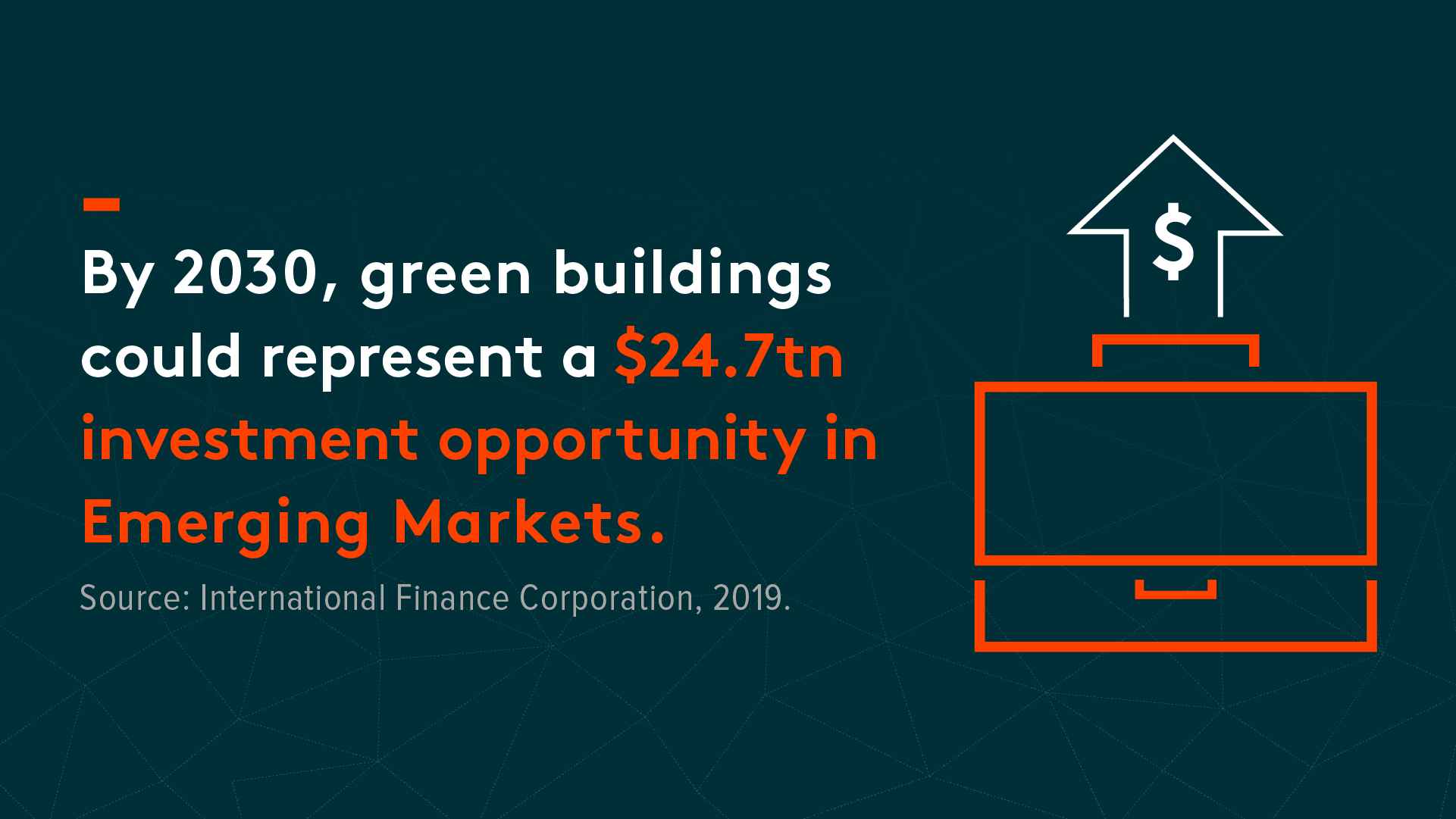 | | | | Government policies and private sector commitments to combat climate change are driving demand for more sustainable buildings. We recently explored the long-term investment case for companies involved in the development, management and technology powering green buildings. Learn more. | | | | Answers: 1. Italy; 2. Japan; 3. Indonesia; 4. Iceland; 5. Tanzania; 6. Russia; 7. Antarctica; 8. U.S./Hawaii; 9. Greece/9a. Santorini; 10. U.S./Washignton; 11. Indonesia; 12. Philippines; 13. Colombia; 14. Martinique. Key: 1. Vesuvius; 2. Fuji; 3. Krakatoa; 4. Eyjafjallajökull; 5. Kilimanjaro; 6. Elbrus; 7. Sidley; 8. Mauna Loa; 9. Thera; 10. St. Helens; 11. Tambora; 12. Pinatubo; 13. Nevado del Ruiz; 14. Pelée |  | | Are you a fan of this email format? It's called Smart Brevity®. Over 300 orgs use it — in a tool called Axios HQ — to drive productivity with clearer workplace communications. | | | | | | Axios thanks our partners for supporting our newsletters. If you're interested in advertising, learn more here.
Sponsorship has no influence on editorial content. Axios, 3100 Clarendon Blvd, Arlington VA 22201 | | | You received this email because you signed up for newsletters from Axios.
Change your preferences or unsubscribe here. | | | Was this email forwarded to you?
Sign up now to get Axios in your inbox. | | | | Follow Axios on social media:    | | | | | |













No comments:
Post a Comment